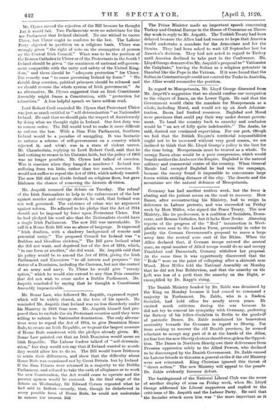Mr. Asquith resumed the debate on Tuesday. The refusal of
the Irish Nationalists to help in the enforcement of the law against murder and outrage showed, he said, that Ireland was not well governed. The existence of crime was no argument against reform. He adhered to his pledge that the Act of 1914 should not be imposed by force upon Protestant Ulster. But he had pledged his word also that the Nationalists should have a single Irish Parliament. The new Bill was unworkable. To call it a Home Rule Bill was an abuse of language. It expressed " Irish dualism, with a shadowy background of remote and potential unity." The proposed Council for Ireland was "a fleshless and bloodless skeleton." The Bill gave Ireland what she did not want, and deprived her of the Act of 1914, which, in one form or another," she did want. Mr. Asquith said that his policy would be to amend the Act of 1914, giving the Irish Parliament and Executive "to all intents and purposes" the status of a Dominion, including the Customs, but not the control of an army and navy. To Ulster he would give "county eption," which he would also extend to any Sinn Fein counties that did not wish to come under a Dublin Parliament. Mr. Asquith concluded by saying that he thought a Constituent Assembly impracticable.


































 Previous page
Previous page